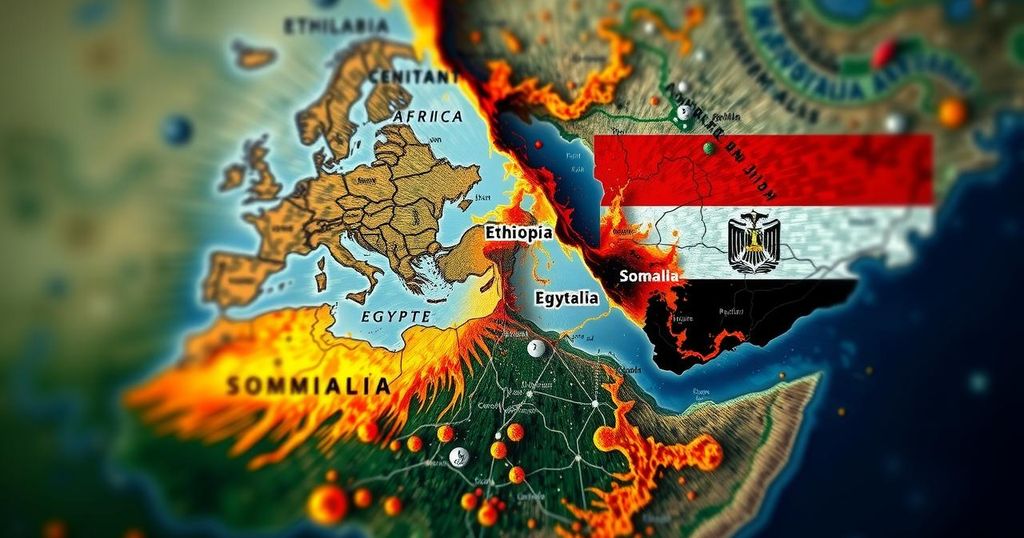The defense pact between Somalia and Egypt has provoked tensions with Ethiopia that threaten stability and hinder efforts against al-Shabaab. As al-Shabaab continues to assert control in southern Somalia, internal divisions and international disputes complicate the region’s security landscape. Diplomatic measures from the EU and its partners are crucial to restore cooperation and prevent a security collapse.
The recent defense pact between Somalia and Egypt has exacerbated tensions with Ethiopia, undermining coordinated efforts to combat al-Shabaab, the militant group wreaking havoc in Somalia. A recent mortar attack on a military base in Mogadishu claimed the lives of several individuals, highlighting the persistent threat posed by al-Shabaab. Despite some military achievements against the group, Somalia’s federal government struggles to assert control, and internal divisions further complicate efforts to establish a unified response. The defense agreement jeopardizes stability by alienating Ethiopia, the primary troop contributor to the African Union peacekeeping mission in Somalia. Such divisions could result in a power vacuum that al-Shabaab is prepared to exploit. Furthermore, the political and military balance necessary for combating extremism is threatened as Egypt looks to increase its military presence in Somalia, thereby challenging Ethiopia. Ethiopia has significantly contributed to military operations against al-Shabaab, yet the defense pact could impede planning for future missions, risking a security collapse. Additionally, rising intra-Somali conflicts, fueled by opposition to federal engagements with Ethiopian troops, may further fragment efforts to combat al-Shabaab, opening doors for the group’s resurgence. Moreover, instability in Somalia could precipitate broader regional chaos, affecting European humanitarian efforts and undermining international security initiatives. The European Union (EU) is well-positioned to mediate tensions between Ethiopia and Egypt, leveraging its considerable financial investments and diplomatic influence in the region. Collaborative engagement with partners such as Turkey and the UAE is essential to redirect efforts toward stability in Somalia. The potential for al-Shabaab to capitalize on these fractures emphasizes the urgency for a coordinated international response. The EU’s existing leverage through funding for peacekeeping missions may compel involved parties to pursue mediation and reconciliation. Addressing these challenges is critical to prevent a security catastrophe in Somalia and maintain stability in the Horn of Africa and beyond.
The conflict dynamics in the Horn of Africa are deeply influenced by regional politics, particularly between Somalia, Ethiopia, and Egypt. The defense pact between Somalia and Egypt emerges from their mutual opposition to Ethiopian influence in the region, primarily affected by disputes over water rights linked to the Grand Ethiopian Renaissance Dam. Somalia’s fragile political structure, strained by internal divisions, complicates its fight against al-Shabaab, a group that exploits governmental weaknesses to maintain power in southern and central Somalia. Ethiopia’s vital role in the region’s security architecture, particularly through the African Union stabilizing forces, highlights the delicate balance of power that this new arrangement threatens.
In conclusion, the Somalia-Egypt defense pact poses significant risks to both Somalia’s internal stability and the broader regional security landscape. The ongoing tensions between Ethiopia and the two nations decrease the prospects for an effective anti-al-Shabaab campaign, risking a resurgence of the group which could destabilize the Horn of Africa. Urgent diplomatic efforts from the EU, Turkey, and the UAE are necessary to foster cooperation between these countries, mitigating the risks of further fragmentation and violence. International actors must recognize that without a unified approach, the security situation could deteriorate markedly, with dire consequences for the region and beyond.
Original Source: ecfr.eu







